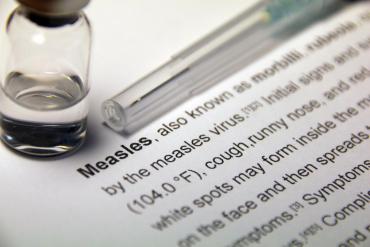Measles Can Be Serious, Are You And Your Family Protected?
Measles cases in the United States have risen steadily in 2019. More than 980 measles cases involving 26 states have now been reported, which is the highest number of cases in the United States since 1994. In the past week numbers of cases have risen by 41. We have not had a case in Wisconsin yet, but Public Health Madison & Dane County (PHMDC) advises people to protect themselves now from this highly contagious disease.
Measles can be a serious disease for all ages and can be prevented through vaccination. The measles vaccination is part of the MMR (measles, mumps and rubella) combination vaccine. PHMDC recommends that families check their immunization records and make sure all family members have received the recommended doses of the MMR vaccine. The vaccine is not recommended for pregnant women or people with weakened immune systems.
“We want people to find out now if they’re immune to measles in order to make sure they’re protected if they get exposed to the disease,” says Kate Louther, PHMDC Supervisor. Up to 90% of people without immunity to measles will become infected if they have close contact with a person who has measles.
“This disease is so contagious because it’s spread through the air when an infected person coughs or sneezes, where the virus can remain in the air for up to 2 hours after the infected person has left the room,” says Louther. “If someone breathes that air, or touches a surface contaminated with the virus, then touch their eyes, nose or mouth, they can become infected with measles,” continues Louther.
Measles symptoms begin with a fever, runny nose, cough, red eyes, and sore throat. A rash then develops that usually spreads from the head to the rest of the body.
Several groups are more likely to experience severe complications of measles: children under the age of 5, adults over the age of 20, pregnant women, and people with compromised immune systems.
About 1 in 5 people who get measles will be hospitalized. Complications from the disease include ear infection, which can lead to permanent hearing loss, pneumonia, and encephalitis, an inflammation of the brain.
As many as 1 in 20 kids who get measles will get pneumonia, which is the most common cause of measles death in young children. Measles in pregnant women who are unvaccinated against the disease can cause premature birth or low birth weight.
“MMR vaccine protects you and your family from becoming ill, but it also protects vulnerable members of our community who can’t be vaccinated, like babies and people with weakened immune systems,” says Louther. “This vaccine is safe and it’s effective,” continues Louther.
To find documentation of immunization records
- People can check the Wisconsin Immunization Registry (WIR) at https://www.dhswir.org/PR/clientSearch.do?language=en
If people cannot find documentation of immunization records
- They can call their doctor for records
- They can get an MMR vaccine (getting the MMR vaccine when you’ve already been vaccinated will not cause harm)
In the event of a measles case in our area, anyone who has been exposed to the ill person who cannot provide proof of immunity to measles will be quarantined for 14 days.
PHMDC offers free immunizations to adults and children who have no health insurance, and children who have Medical Assistance. For an appointment, call (608) 266-4821.
Contacts
- PHMDC Communications, (608) 243-0482, communications@publichealthmdc.com
